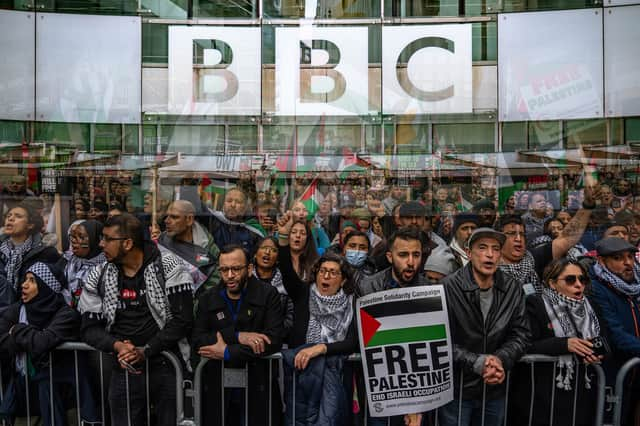BBC: broadcaster hit with 8,000 complaints about Gaza war
and live on Freeview channel 276
The BBC has been hit with more than 8,000 complaints about its coverage of the Gaza war since Hamas' attack on Israel, MPs have been told.
Concerns have been raised by the public over the perception of bias in the broadcaster's reporting of the conflict, which has seen around 1,500 Israeli's murdered and tens of thousands of Palestinians killed. BBC director of editorial policy and standards David Jordan told the Culture, Media and Sport Committee that the complaints were split fairly evenly between the two sides.
Advertisement
Hide AdAdvertisement
Hide AdHe said: “As of this morning, we had just under 4,000 people complaining that our… output, rather, our coverage, was biased against Israel and over 4,000 that was biased in favour (of Israel). They are actually pretty similar, which reflects the differing opinions in the country as a whole on that.”
'Pro-Hamas' retweets by BBC Arabic staff
BBC director-general Tim Davie revealed that BBC Arabic staff had left the corporation after retweeting remarks that were called “essentially pro-Hamas” by Conservative MP Damian Green. Davie said: “Some of those tweets that we’ve seen are unacceptable, and we have taken action and we’ll continue to take action; whether I can convince you that it will never happen again… of course not.
“We are robust and I think we’re doing the fair thing, we’re acting fairly and judiciously and it’s not easy. I mean, you’re seeing it around the world, every news organisation, every cultural institution as you know is under enormous pressure… this is enormously fraught.”
New guidance on social media for BBC employees was published in September, which said they must not bring the corporation “into disrepute” and are required to be respectful in public. Davie said he was “very proud” of the BBC Arabic service.


Reporting on ICJ investigation into genocide claims
Advertisement
Hide AdAdvertisement
Hide AdMPs also asked Davie about the BBC’s reporting of the International Court of Justice submission by South Africa alleging that Israel breached the Genocide Convention with its military offensive in Gaza. He said he gets “significant feedback from either side”, and added: “Overall I think we have been pretty robust in covering the ICJ rulings. We’ve been in a reasonable position.”
While Jordan told the committee that South Africa and Israel’s submissions receiving different amounts of coverage on different days “only happened on our UK output”, due to the need to cover a hearing about the Post Office scandal.
“When news looked at it in retrospect, they did think that perhaps they did make a mistake by not making the two live coverages similar or the same, but all the other coverage was similar or the same,” he said. Jordan added that an update to editorial guidelines will be available for publication “hopefully before the general election”.
Israel has denied the accusations by South Africa saying they are “wholly unfounded in fact and law, morally repugnant, and represent an abuse both of the Genocide Convention and of the court itself” in court documents.
BBC 'does not have institutionally bias' about transgender people
Advertisement
Hide AdAdvertisement
Hide AdDavie also was asked about the Culture Secretary Lucy Frazer saying that the BBC is biased “on occasion”. He said that the BBC is able to “steer the course amongst the noise” despite “the storms of social media” being “very demanding”. He said he “worries” about public institutions losing trust in the current social climate.
MPs quizzed Davie about an impartiality complaint being upheld against BBC Radio 4’s Today programme presenter Justin Webb after he said that “trans women, in other words males”. The director-general said that the transgender issue was “an area of controversy” and the BBC does not have “institutional bias” in this area.
“We don’t have no-go areas in the BBC, to do that we do demand of our journalists to keep within our editorial guidelines,” he said. “We have to be kind and caring in this, and listen to people and be nice.”
Davie dismissed reports that he had been “deluged” with emails criticising the Executive Complaints Unit (ECU) for upholding a complaint about Webb. “This is being whipped up as well around us in a way that is deeply, deeply damaging to civilised debates about these topics,” he said.
Advertisement
Hide AdAdvertisement
Hide AdHe added that the corporation is “not being lent on” by political actors and the BBC does not make decisions due to outside pressure.
He said: “The pressure is ferocious from every side… this is a more polarised time, I talked about this, everyone wants to proscribe intent, you know there are people who think we’ve got an agenda to the right and an agenda to the left, we’re woke warriors on one side, we’re small-c conservatives on the other.
“I can tell you that if you go and meet the editors of programmes like Question Time, I’m fiercely proud of them, because what they’re trying to do is calmly get this right.”
Ralph Blackburn is NationalWorld’s politics editor based in Westminster, where he gets special access to Parliament, MPs and government briefings. If you liked this article you can follow Ralph on X (Twitter) here and sign up to his free weekly newsletter Politics Uncovered, which brings you the latest analysis and gossip from Westminster every Sunday morning.
Comment Guidelines
National World encourages reader discussion on our stories. User feedback, insights and back-and-forth exchanges add a rich layer of context to reporting. Please review our Community Guidelines before commenting.
